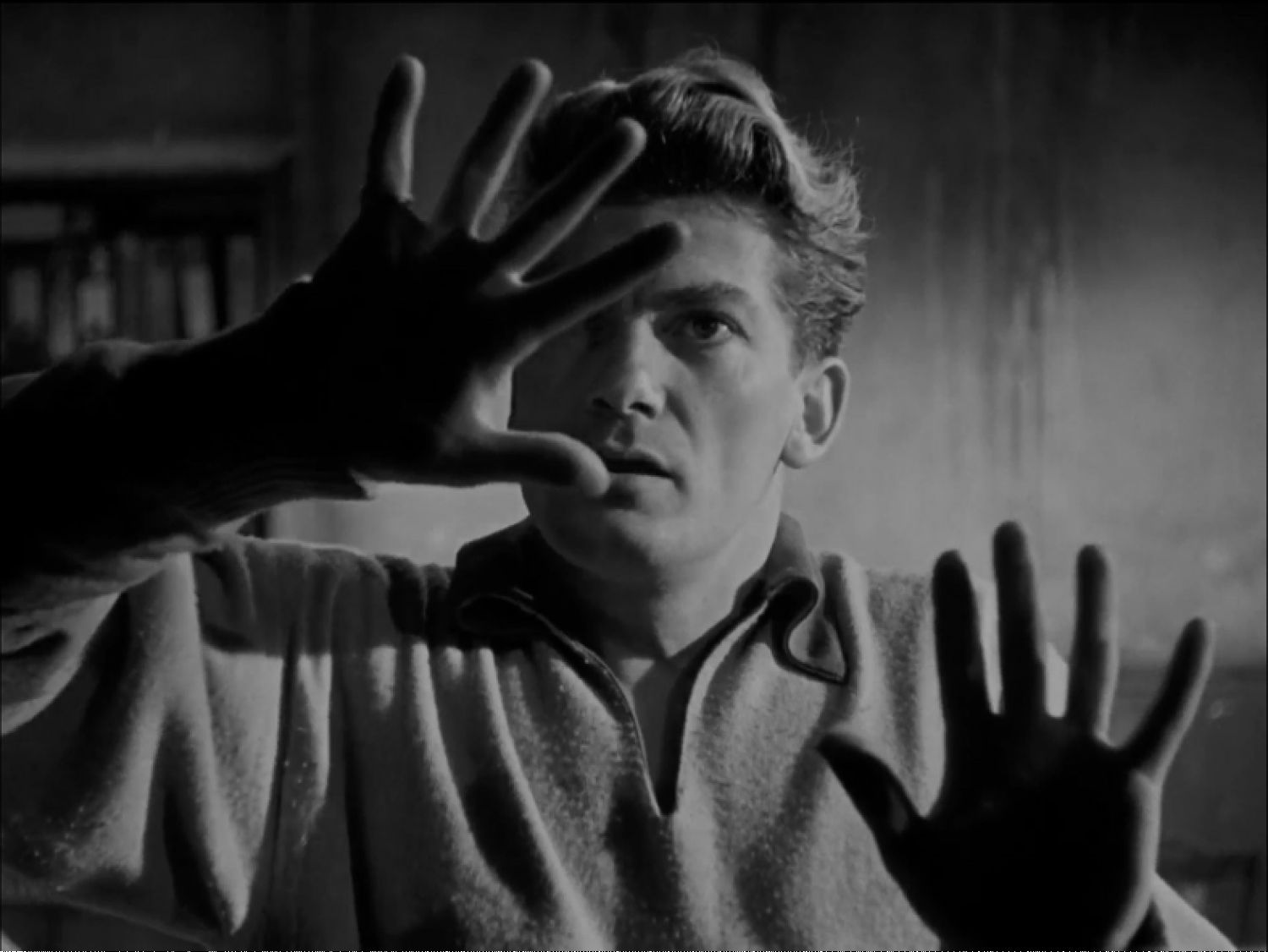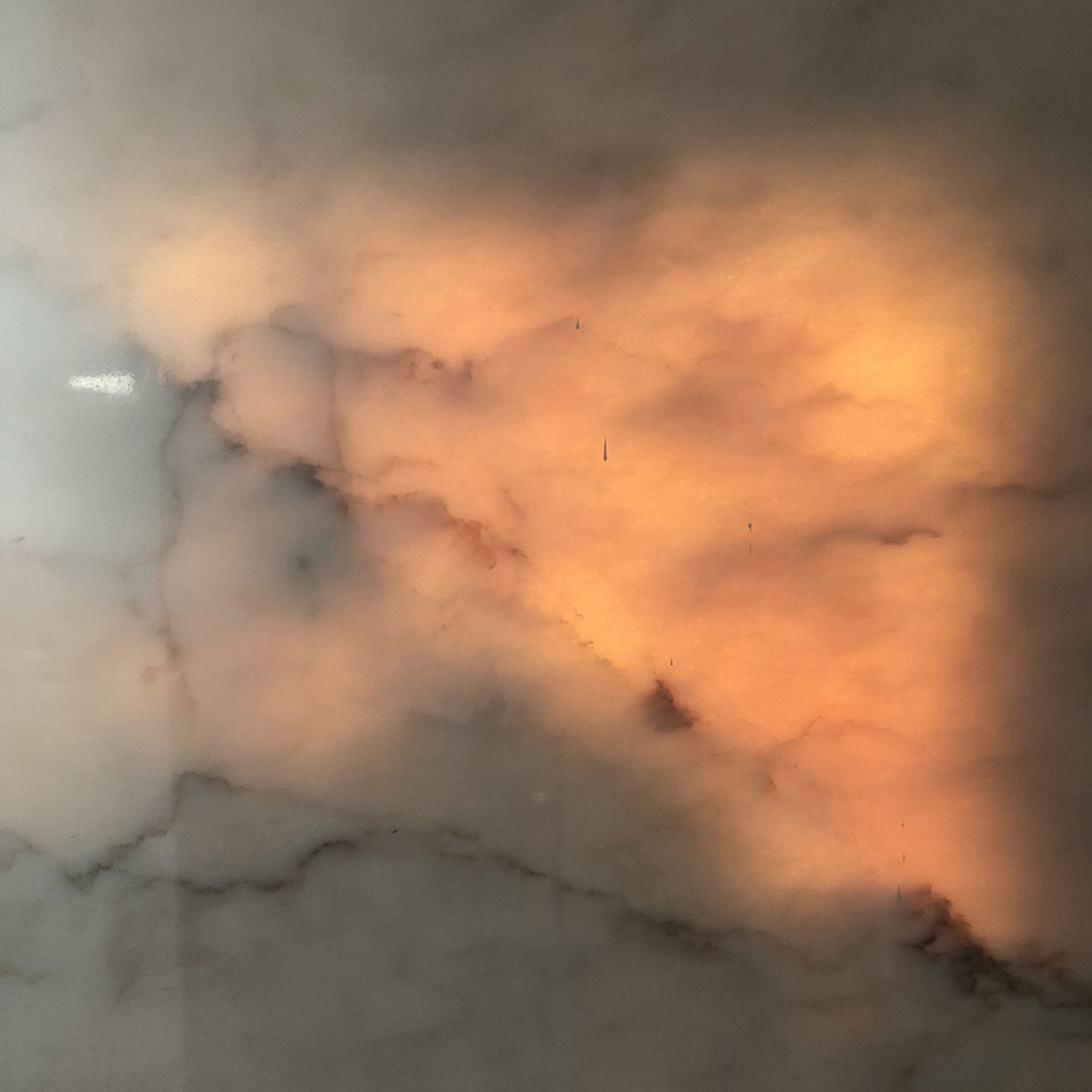Central
Maria João SoaresText fragments for a homodiegetic and omniscient narrator
[striked through]
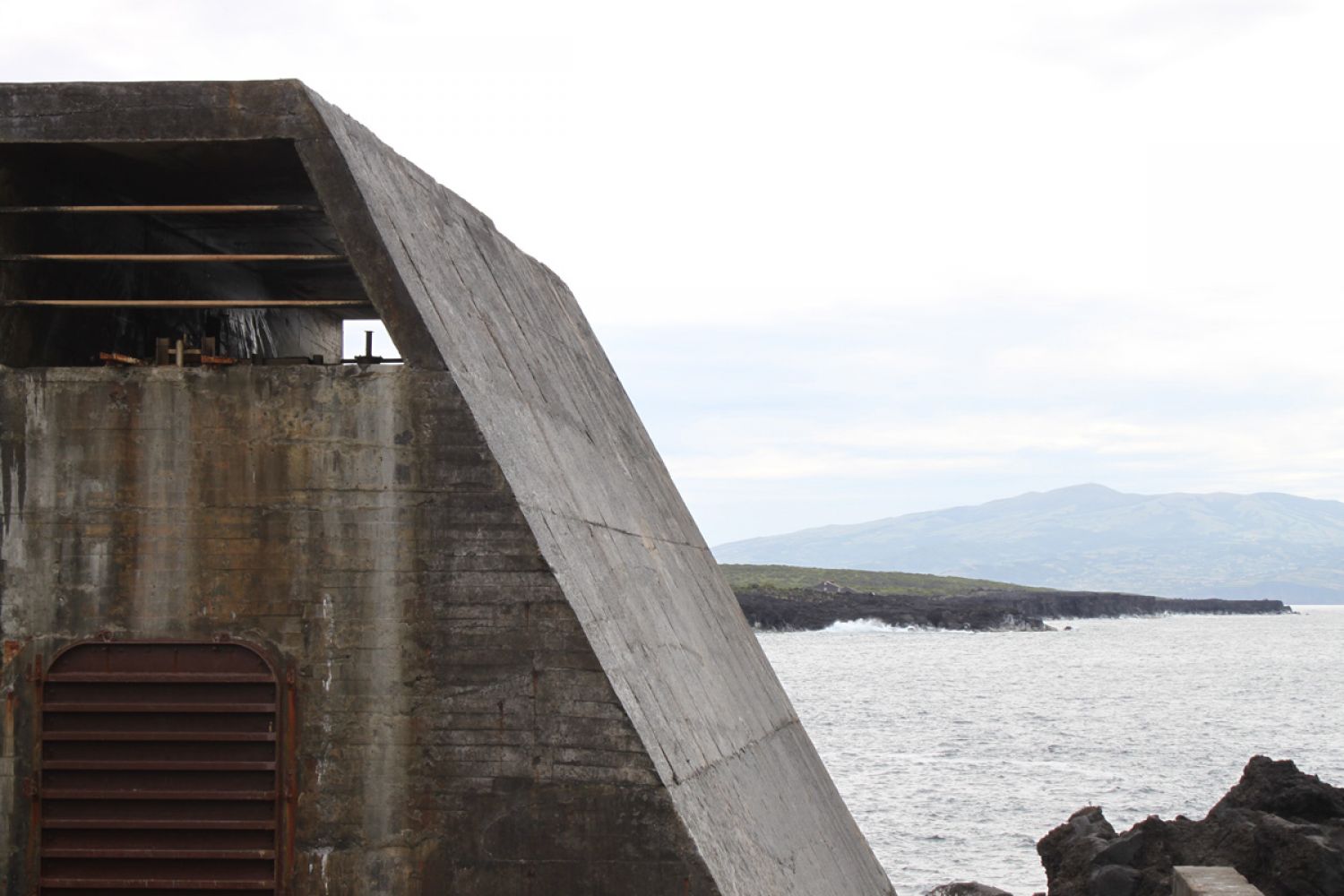
Fragment # 1: the box
Coming in from the sea, the camera slowly approaches the box, almost hitting it. Are we on a boat, or are we in the sky?
It took only once for this block to become something it was not. One trip to the island was enough for me to get closer to it and to put things inside of it that were not there before. The 4thtime around in the island, I found the ideal thought to put inside it and that thought was the ruin. I imagined it there, its interior, its outline, the viewpoint, the distant view, the closer view, the detailed view, the whole.
All possible shots are not enough to conquer the box... this kind of cube. The more I try to swerve from it, the more it settles in. Desire becomes memory, memory becomes an atrocious thought. Distance compels me to do a night shot, a shot where we try to look at it straightforwardly, take its measurements, think about what it is, what it is not, wonder if it is natural or imposed... a ruin is solid like a rock, though this rock doesn’t seem so true to me. The camera crashes into it, and, since it is nighttime, so do we. How should I face it? The waves appear to pound it, to destroy it, and they do it incessantly, just never suddenly and in plain sight. Guilt and desire, they’re there, precise and scattered at the same time. There is the muddle, the sea muddle, the mountain of calling, the lava of both exhaustion and absolution.
While I was still on the other side, before the island, before the box, I thought about whether I was asleep or, rather, extinct. Now, looking at the box, I wonder if I might just ruin myself as well if, by any chance, I start to think about it.
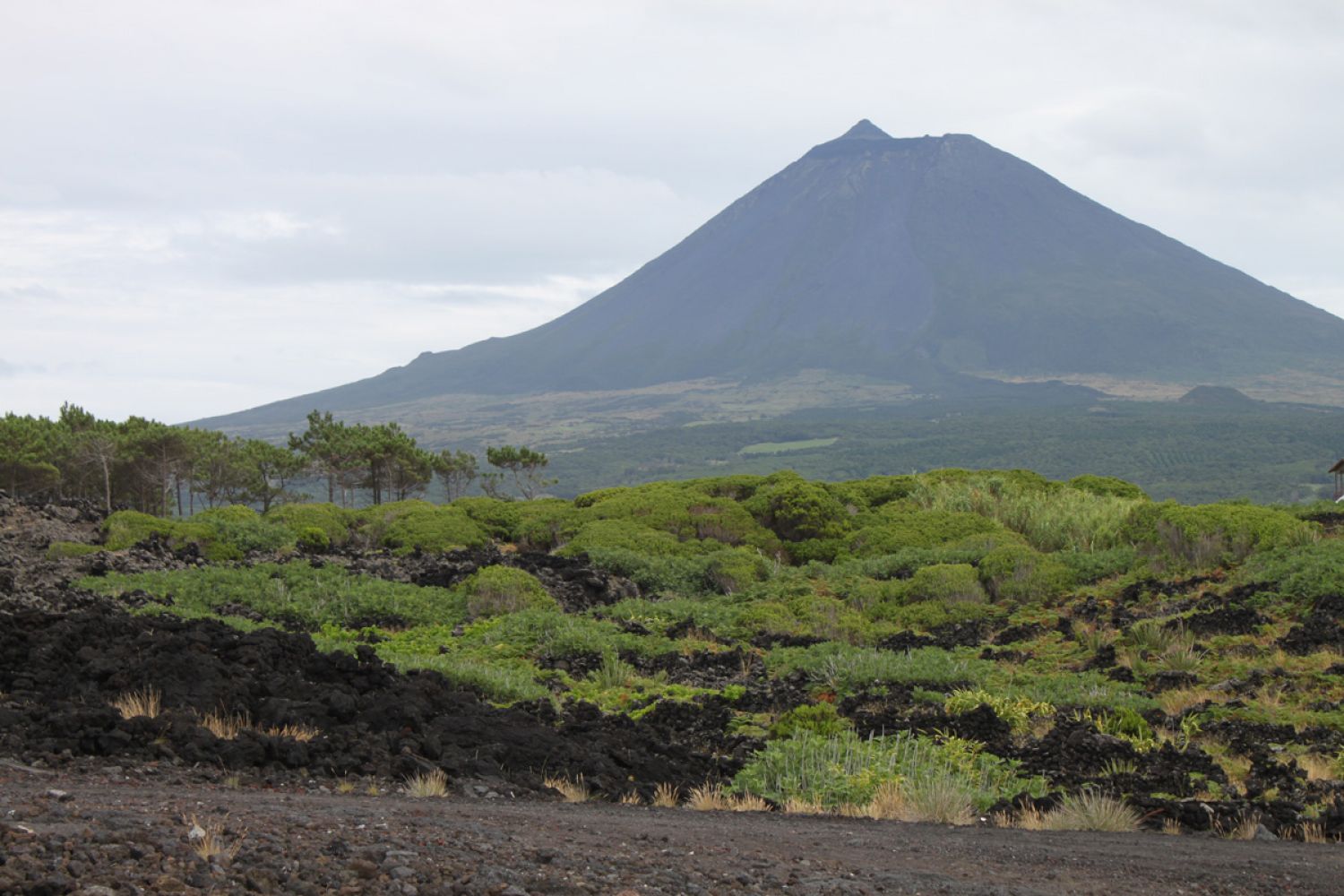
Fragment # 5: the map and the houses of God
In my first climb to Pico, there was still a map.
We arrived late, right before we had to go down again. We landed above the clouds for half an hour. Half an hour of illusion, since we were in gods’ place. I didn’t know it yet... the box. It wasn’t necessary to look for it on the horizon. I didn’t. With the clouds in my face I wouldn’t see it anyway. We went down in time to board the boat. We lost ourselves at every step of the way and, at every new step, we found ourselves again, like so many other hikers, for, below the clouds, a thick fog had settled. We had to follow each other’s footsteps, a mark after the other, the I and the other connected.
You can only leave this island by boat or by plane. Meanwhile, I remember Mont Saint-Michel in Normandy, where in fact I never went. It was called Mont-Saint-Michel-au-péril-de-la-Mer (endangered by the sea?) and, before that, Tomb-Mont – which means, among other things, grave. There is a bridge, but it's still an island. Before it became surrounded by water, that place did not have the same power of calling, I can say it safely. I don’t understand yet why, but the relationship between these two sites takes shape in a very improper way in this film, although it feels too soon to swerve from it. At its center, Saint-Michel has a monastery. The house where we can find God if we really want to find Him. Outside its walls, at the banks where water perseveres, are the true men. Are they? I wonder how it’s possible that these blessed men keep on being flooded by an immense lava of faith, since they can walk by their own feet towards the mainland whenever the tide is low.
I never believed in men that are overly believing. I must return to the object of contemplation and refuge from this other island, but I am visited by a recurrent thought: what will happen to my team every time the good weather allows them to cross the channel? Will they want to run away from this place if I tell them it will question and disturb us like a house of God and that we must search for something there? If this narrator wasn’t also a «kind of iconoclasta», perhaps we could find consolation within the pantomime this film risks to become.
I don’t think that the feeling of ruin can be shared and divided like this. I’ve always felt uncomfortable with this kind of algorithms, not because it was difficult to understand them – since the math of things is there to be taken and found – but because I never found one that could explain me how ruins can stop occupying the square meters and also the cubic ones in the house of God.
I couldn’t yet imagine the box and Pico in the horizon, behind it. Maybe it wasn’t there yet, maybe it might never be there. I would have to know the travel date accurately, but I do not think accuracy is that important at this time. I’m certain that you understand. It was the first time on the island, the first time on this low angle/high angle island. We went down too quickly. We lost ourselves. «To the sea!» Towards the sea is the path we never lose. We boarded the boat. The waves were high, as sometimes happens with the fog.
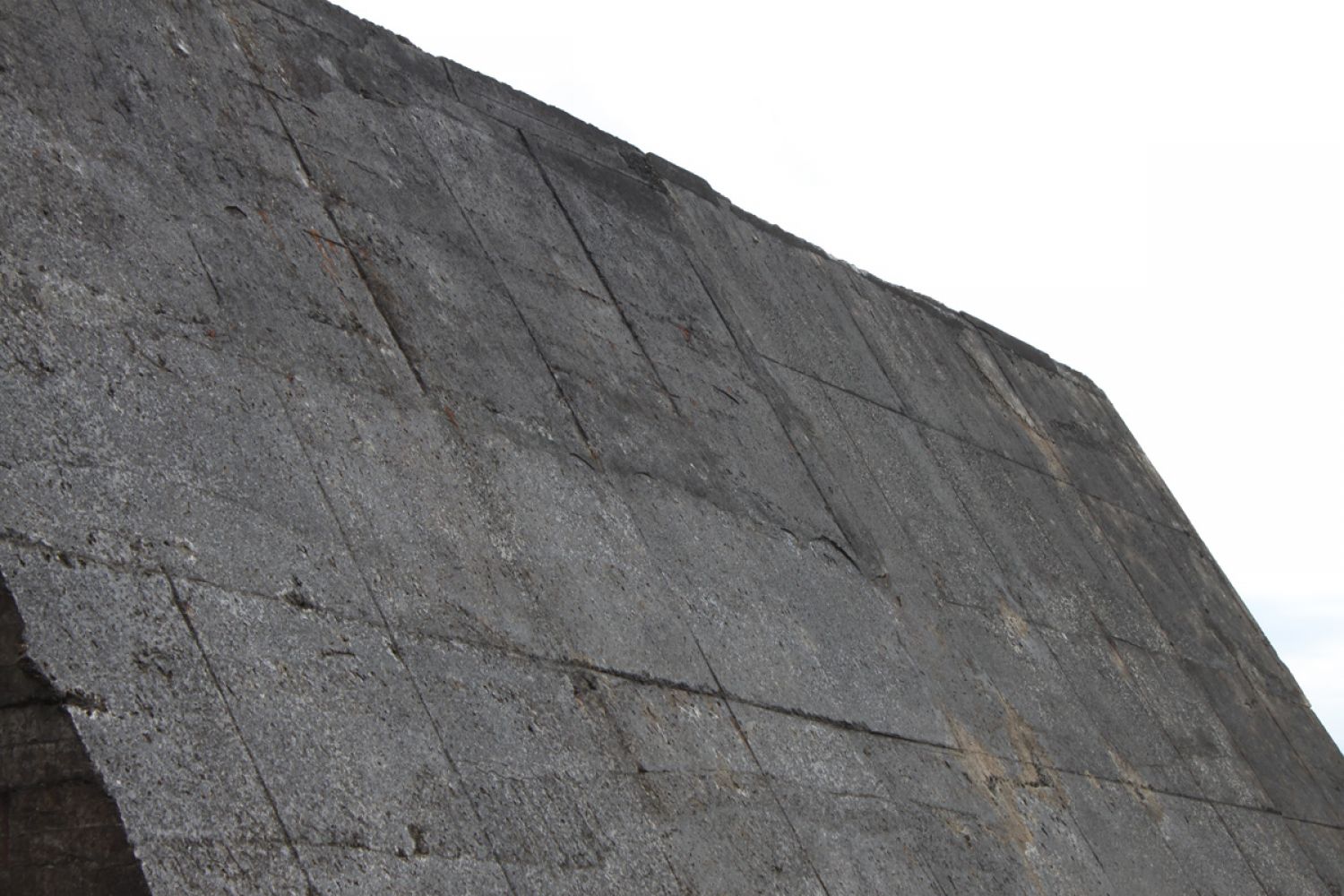
Fragment # 8: Paladin, Corbusier, film and lava
This film’s subject, the Central, has been functioning since 1999 as a pilot energy production unit powered by waves. It’s located at Porto de Cachorro (Puppy’s Port). Puppy is the name we give to small dogs and to the sausage sandwiches that I used to eat with Paladin mustard on my visits to Lisbon as a child at Cinema Império’s restaurant. What a party. Happiness condensed in a piece of bread. That theatre has become, for many years now, a place of worship for Igreja do Reino de Deus (God’s Kingdom Church). Nowadays, each time I pass nearby, I pretend not to remember the other kinds of dreams and illusions that were screened there and I try to make peace with idealisms. Corbusier said that a house is a machine to inhabit («Une maison est une machine-to-habiter»). This Paladin childhood was also inhabited by this master of concrete who someone told me about, always as something new, for 20 years. We had 2 books about him. The last time I was in Paris, at a workshop about 16mm, I caressed a Bolex and its insides. Going from the airport to the city, we passed a social building complex engineered by Mr. Corbusier. It had nothing friendly and it was not built to lodge people… nor images. I asked myself if that machine had pleasure caressing the film when it went through its bearings. I must find a way to inhabit that cube. Surely it is also a machine, which immediately instrumentalizes what you can take from it.
I told my team: «I’ll lose my mind with these shearwaters». They seem like babies crying. They appear from nowhere. We can’t see them at a distance. They appear in the night, which is even more disturbing. I lie around lava, I cover up my ears. Fuck what people think about not wanting to listen. The night I ruined myself and forgot for a few moments the characters that had climbed the mountain at the beginning of this story, I tried very hard to explain why I could go insane with that sound. How can a man’s heart understand a woman’s ears? The desire of entering the ruin collided with a full moon surrounded by dancing clouds. Lying down in the volcanic sand I stopped to look. The way substances affect me more than people is something I will try to understand throughout this film or, at least, throughout this life. I no longer see the other person, she becomes invisible. While the object of desire kept on winning some space, I was only capable of thinking about that cloudy moon speaking to me and spitting reheated lava in my face. «I’m reheated», I thought. Reheat is to heat again what was already heated. It doesn’t taste the same, we have to say it. The sea and the box eat each other. It’s funny. Who swallows what? Swallow? Don’t swallow? I always found this question ridiculous. It doesn’t matter. We swallow each other in so many other ways, much more spectacular than this. We swallow so many things that we never thought about swallowing. I wanted to put myself on the path of those waves, fasten myself to the box with a rope, of course, since I believe in life. The foam filters the obsession about what it would be like.
I must focus on how the box works. The side wall is clearly degraded and close to collapsing – «damaged», the experts say. While I think about that, I see, over and over, the Rossellinis, Bergman, Magnani and a light of self-awareness seems to pulse onto the concrete structure, a light bigger than the one that might be screened. Will we be capable of editing the images of this living dead? Concrete does not shout, we shout. Film does not scream, we make it scream. I release the sound operator so he can go and explore the surroundings. I think: I hope he doesn’t drown... How ridiculous the thought of a catastrophe can be.
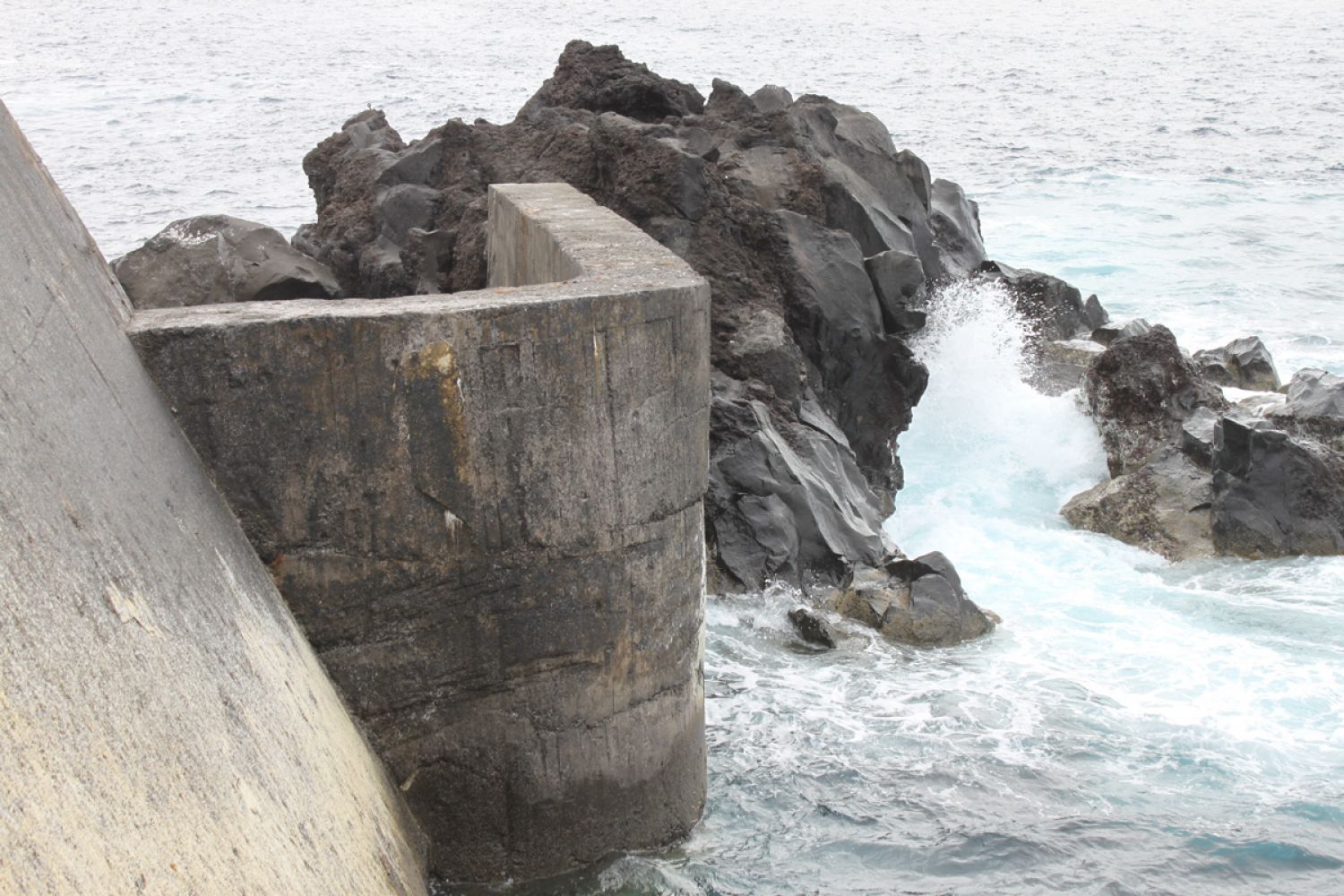
Fragment # 13: on the waves and on heart
The paintings of a few impressionists, who I would have loved to meet in person, give significance to the different heights and textures of the waves. In the early morning, we witness its prognostic. For the purposes of condensing our attention and improve the efficiency when taking pictures of the sea, we want the waves to be voracious at times. Can we put ourselves there, on that landless field, since the risk of being swallowed is so high? Who would save us from ourselves? After all, who dares to look the sea in the face like this, this close? It’s time to step back and summon the teleobjektiv, as if it was a divine providence. If we didn’t already have the front doors completely wide open, we would certainly inhibit ourselves from speaking about our semi-aesthetic resources here. Forward we must go, forward!
How delicious is this list of interjections now that we're all tuned. The skyline is really only useful for thinking.
The heart beats its dazzling beat as we enter the deepest water. It’s inevitable to make this sound path since it’s evident that here we are connected through the heart. I met hearts with atypical beats and someone once told me cryptically: «I feel my heart.» How do we reply to this? «Good for you?» Life pulsates around us disproportionately, even when we think nothing is pulsing in us anymore. What if we captured the heartbeats of the interviewees? Please, let’s properly measure the different pulsations. I can no longer look at this box without comparative analysis. This is what we understand about engineering in happiness? «Pound, pound, pound.» The sea advances on the structure, following the rhythm of the waves. Sea, is there something you wish to tell us? Would you like to say something besides pounding? Do you want me to sing the mermaid’s song? We could speak about the dead people you are keeping, if you want. You are so lucky because we aren’t on that mediterranean, so don’t feel forced to give us answers. It is not you who is asking the questions. Here we are, talking about death in life, but don’t fool yourself, it is the very same thing.
Back on land, I finally find the container where the power transformer is located (Transformer's Container). Look how beautiful and wonderful! A box to keep promises, things that become other things and also reveries. So far, this text made some sense, at least for me... It loses it while I’m looking at the container. What should I do with this? What a difficult thing to film. It doesn’t move. Nothing is apparently moving inside. It’s just there. It seems to me that, in film, something has to move or we have to move something ... Let’s wait for a moment, I’ll give it a second chance. A fixed-dead-shot: we can laugh.
accident – pneumatic strength / strength – aerodynamics/ dynamics – action / active power
There is something in this scheme explaining the existence of the transformer that I enjoy very much. I am not very familiarized with powerful accidents, although they seem to me to be a wonderful source of energy for us to feel alive. A strength appears from where it seemed impossible to come. Day-by-day, the incident and the hitch are not satisfactory. Though it seems to leave us in living flesh, as in Almodovar’s film. More than reheated, we’re inflamed, warmed up, truly heated. When it seemed that we no longer had legs to stand up, arms come along which make us achieve dynamic pleasure, the active power that comes from giving and receiving. Flames can now appear in our transformer. We are not prepared to put out the fire when, in reality, it just wants to be touched. Bring the water again please, before everything implodes. I realize that I just want to go back close to the box. It’s urgent that we find other points of view for the general shots.
–
Note: the fragments presented are part of the work in progress narrator’s text for Central, a documentary about the Wave Energy Pilot Plant located in the Pico Island in the Azores, which is in the development phase. Central will reflect upon the present condition of that unit by focusing on the elements that make up its structure, on the natural surroundings and on the testimonies of those who contribute to its existence. This portrait is also the ground for questioning the idea of ruin and filmmaking as a creative act.
